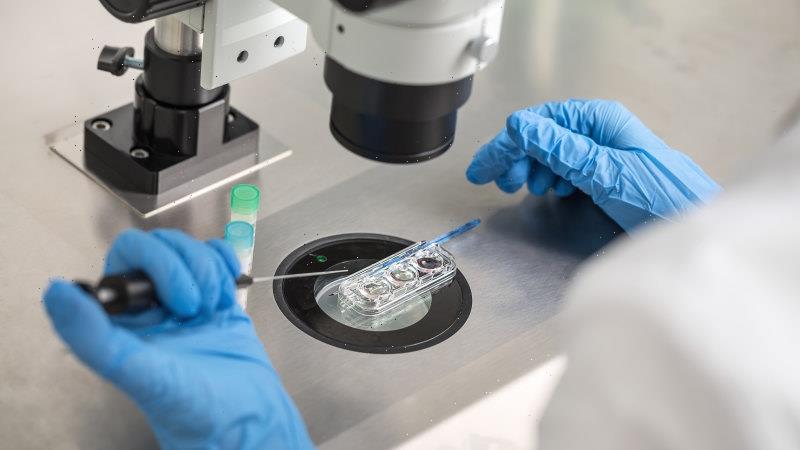Our live coverage of the coronavirus pandemic is free for all registered readers. Please also consider supporting our journalism with a subscription.
The Victorian government says it is working hard to resume in-vitro fertilisation procedures in hospitals soon, after Prime Minister Scott Morrison said pausing IVF should be a “last-resort”.
The Andrews government halted most IVF procedures in hospitals on January 6 in response to the rising number of COVID-19 hospitalisations which are expected to continue increasing for weeks.
IVF treatments have been paused amid the crisis in Victoria’s hospitals.Credit:iStock
People can still complete their cycles if they began treatment before January 6, and those who require urgent treatment because their eggs may be rendered unviable due to imminent health treatment can also still access IVF.
“The most time-critical procedures within an IVF journey are still happening,” Premier Daniel Andrews said on Tuesday.
“I’m sorry that these services have been impacted by the global pandemic. I’m sorry that any services across the board have been impacted.”
“I want to assure everyone who’s impacted by this that we’re working as hard as we can to get day procedures back up and running.”
The pause on IVF – where an egg is fertilised by sperm in a lab to overcome fertility issues – drew a negative reaction from the Prime Minister who claimed national cabinet agreed early in the pandemic that IVF should not be halted along with other elective surgeries.
“At national cabinet, we said that IVF treatments were not elective procedures and should continue. I believe that should be done wherever possible and that should be such a last resort measure,” Mr Morrison said.
“I respect the fact that these are decisions of the Victorian government. I respect that it’s not a decision the Commonwealth can make. It is a decision of the Victorian government and I appreciate the extreme pressure their hospital system is under.”
Opposition Leader Matthew Guy called on the government to urgently resume IVF procedures and argued the halt was indicative of the government’s lack of preparation for a wave of COVID-19 hospital admissions.
“That is not a reflection on our health and emergency services workers – it’s a reflection on the people who run [the health system],” he said. “For 12 of the last 16 years, it’s been run by the Premier, either in his current job or [between 2007-2010] as health minister.
“It is very important we do not delay to IVF treatment. You can’t evade making this decision because couples need this. It doesn’t take up critical beds.”
The Premier explained some health services are cancelled because authorities plan for the upper limit of forecast pressure on hospital capacity. He said these decisions could be revisited if the real level of demand did not turn out to be as high as feared, allowing some elective surgeries to resume more quickly than envisaged.
“We will have, hopefully, positive news for day procedures … very, very soon,” he said.
IVF patient Kim Stolke wants the ban reversed.
Kim Stolke has endured 14 miscarriages, lost both her fallopian tubes and has been diagnosed with diminished ovarian reserves. She has been attempting IVF treatment for seven years and was due to start her ninth egg collection this month but due to the three-month ban on IVF treatment, she will have to wait.
“My fertility doesn’t pause, my ovarian reserve doesn’t pause. There’s times where I’ve done an ovarian check and it’s decreased within three to six months so every single month for us is critical,” said Ms Stolke, 39. “We don’t know if that one month is my month for my baby.”
Number One Fertility medical director Dr Lynn Burmeister said for many, 90 days was the difference between having a baby or not.
“We don’t know what cycle or what month will produce that ‘baby egg’ that we need. Some patients have a very low egg reserve or they are over 35, so every month is critical,” she said.
“It’s not a matter of simply stopping and starting treatment – there’s a lot of preparation that goes into IVF, like taking medication and vitamins, counselling and appointments.
“Egg collection for IVF in hospital uses minimal resources, patients are not admitted to wards and the instruments we use aren’t used in any other surgeries. Patients are usually in and out of hospital within two hours and in the theatre for around 20 minutes.”
“I don’t believe IVF day procedures impact on COVID patients or COVID care – but I can tell you that this ban is impacting potentially thousands of people, desperate to start a family.”
With Tricia Lee Rivera
The Morning Edition newsletter is our guide to the day’s most important and interesting stories, analysis and insights. Sign up here.
Code brown – what it means on the ground
What are hospitals doing to cope?
- Statewide ban on less urgent category two and three elective surgeries.
- Healthcare workers required to perform different roles from normal duties.
- Tents set up outside emergency departments to examine people before they enter.
- Cases not deemed emergency will be sent home.
- Quarantine hotels will be used for COVID-19 patients to free up hospital beds.
- The private hospitals agreement has been enacted, which will make more resources available to the public sector.
- Healthcare workers may be asked to cancel their leave.
Options if the situation gets worse
- Services used to detect life-threatening conditions, such as cancer screenings, could be halted.
- Category one elective surgery may need to be delayed.
- Asymptomatic COVID-infected staff may be allowed to keep working.
Most Viewed in National
From our partners
Source: Read Full Article


